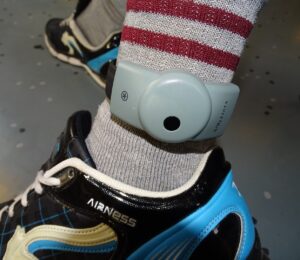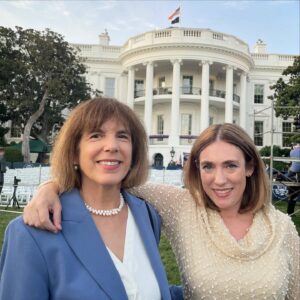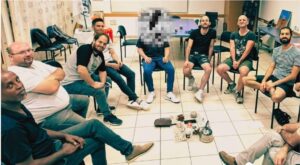September 20, 2024 — Hadassah Foundation grant recipients are at the forefront of improving lives for women and girls in both Israel and the United States. Here’s a small taste of some of our grant recipients’ recent work and accomplishments. You can learn more about each grant recipient here.
Surveillance Law to Protect Israeli Abuse Survivors Goes Into Effect

Jeremy-Gunther-Heinz-Jahnick/Wikimedia Commons
The electronic surveillance law that several Hadassah Foundation grant recipients, including Women’s Spirit, successfully lobbied for and that passed in August 2023 just went into effect this month. Unfortunately, its implementation will not meet the tremendous need. Only 100 domestic abusers with restraining orders will be required to wear these bracelets, which warn the abuse survivor when they are nearby and if they are violating the order. However, according to Israel Women’s Network (IWN), 850 requests for restraining orders are filed every month. Meanwhile, the government has done nothing to publicize this program to women who might benefit. IWN is pressing key Knesset members to expand the number of surveillance bracelets available, while the Rackman Center is calling on the government to step up community outreach.
_____
Standing Up for Israeli Women and U.S. Domestic Abuse Survivors

Deborah Rosenbloom and Rachel Graber of JWI. (Courtesy of JWI)
Since October 7, Jewish Women International (JWI) has been pushing leaders and nonprofits around the world to recognize and condemn the horrific acts of sexual violence Hamas committed that day. This spring, in partnership with the Seed the Dream Foundation, it launched “I Believe Israeli Women,” an initiative that fights disinformation and denial, mobilizes solidarity with Israelis, and works to end all conflict-related sexual violence. On Monday, September 23, it is hosting an online discussion with Amnesty International Israel entitled “How Are Feminists Responding to the Gender-Based Violence of October 7?” Separately, JWI’s chief program officer, Deborah Rosenbloom, was honored by President Joe Biden on September 13 for her work on behalf of women and girls. The White House event commemorated the 30-year anniversary of the passage of the Violence Against Women Act, which JWI lobbied for.
_____
Helping Israeli Men Process Trauma, Prevent Violence

A men’s group in Beersheva. (Courtesy of ASLI)
ASLI: Israel White Ribbon, which engages men and boys in the effort to eliminate violence towards women, has been hosting in-person and virtual drop-in “men’s circles” where men returning from army reserve duty have space to process their emotions and trauma. The idea is that men who feel emotionally supported and heard are less likely to become violent. A facilitator in Haifa, told ASLI: “Everyone came from their own personal and private world and each one brought all his emotions – sadness, confusion and bereavement. We talked about the shared experiences between men, about sacrifice, about the limitations that the definition of ‘man’ puts on us.” In addition to hosting men’s circles, ASLI has been responding to the thousands of October 7 videos that Israeli children are encountering on social media. It has been distributing a toolkit it created for parents about how they can mediate the content of these videos with their children, explain their true meaning, and handle the pain and harm they cause.
_____
Pushing Back Against All-Male Decision-making
Israel Women’s Network and Forum Dvorah successfully helped influence the Prime Minister, Treasury Minister, and Defense Minister, who appointed six women to a new committee created this summer. When the committee, which is tasked with the critical assignment of reviewing the military’s budget during the ongoing war, was first announced it was all male. Thanks to Israel Women’s Network and Forum Dvorah, women now make up 50 percent of the committee.
_____
Empowering Jewish Teens and Parents

Kol Koleinu cohort (Courtesy of Moving Traditions)
Moving Traditions recently announced new cohorts of its two teen fellowship programs: Kumi, which trains participants to help build more inclusive communities and movements for justice as Jews, and Kol Koleinu, which empowers young Jewish feminists to effectively speak their minds and create the change they want to see in the world. Kumi brings together teens from throughout the United States for a four-day retreat, coupled with three virtual sessions. The Meyer-Gottesman Kol Koleinu Fellowship engages female, trans and non-binary teens for monthly meetings where they learn about feminism and develop social change projects with social activist mentors. The group has also been hosting frequent webinars for Jewish parents, including “Navigating Politics with Your Teen,” scheduled for Tuesday, September 24.
_____
Israel’s State Comptroller Embraces Adva Recommendations
Adva Center’s recommendations for advancing gender equality were echoed in a recent report issued by Israel’s State Comptroller on Israel’s decreasing ranking in the global gender gap index. The report emphasizes the importance of taking proactive actions to promote gender equality and reduce gender gaps in local authorities. A recent grant recipient of the Hadassah Foundation, Adva is a nonpartisan policy institute that conducts research about a variety of social issues.
